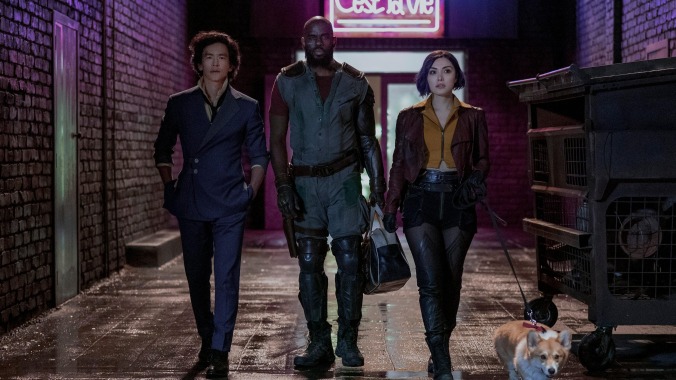Netflix’s Cowboy Bebop is a bloodless substitute for the real thing
Netflix’s live-action Cowboy Bebop, starring John Cho and Mustafa Shakir, won't challenge anyone's assumptions about anime adaptations

It’s easy to look at Netflix’s live-action adaptation of Cowboy Bebop, an anime so highly regarded that even calling it a “masterpiece” might not cover it, and just assume that it never had a chance to live up to its potential.
The entertainment industry has a shaky history with live-action adaptations of anime, both on Netflix and elsewhere. To take on something like Cowboy Bebop, which has already proven itself so brilliant in its music, art style, and largely unimpeachable English dub, and try to make it into a new series that will inevitably be compared to one of the high-water marks of an entire artistic medium seems like nothing more than volunteering for failure.
Netflix’s Cowboy Bebop is not a complete and irredeemable disaster, but it’s definitely not going to challenge anyone’s assumptions about live-action anime. Its best moments come from playing to its own strengths rather than emulating those of the original. When it comes to expanding on the ideas or characters from the anime, the Netflix show offers only the most obvious and overused storytelling beats.
This new show, like the anime, is about a team of bounty hunters called “cowboys”—John Cho’s Spike, Mustafa Shakir’s Jet, and Daniella Pineda’s Faye—who are all running from various tragedies in their pasts. Once more, Spike’s past involves a heartless killer named Vicious (Alex Hassell) and a mysterious woman named Julia (Elena Satine). It takes place in the far future, with mankind having colonized various other planets in the wake of a disaster on Earth. The main crew lives on a junky old spaceship called the Bebop.
Unlike the anime, the live-action series sometimes feels like it’s embarrassed to be associated with any of this. Things that the original expects you to just accept, like character names, are questioned and underlined and over-explained here. Iconic lines or songs are dropped like someone was checking them off a list, and other moments directly pulled from the source material are needlessly expanded to clearly spell out character motivations. If there’s a cool thing from the anime, this Cowboy Bebop will fight like hell to make it sillier or stupider.
André Nemec’s adaptation doesn’t trust the audience nor does it trust itself; it plasters over that lack of confidence with a sense of cartoonish detachment in the sets and the performances that practically say, “We’re not taking any of this too seriously, so you don’t have to either.” The actors are mostly fine, given the heightened silliness of everything going on. But Cho is clearly putting his entire heart into the role, and he does a phenomenal job because of it. Pineda also finds new angles on Faye to make her feel like her own character, but Shakir is outpaced by Cho and gets lost between doing his own performance and trying to emulate the Jet from the anime.
 Keep scrolling for more great stories.
Keep scrolling for more great stories.
